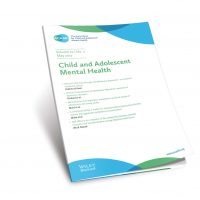LMIC
-

RESEED – the perceived impact of an enhanced usual care model of a novel, teacher-led, task-shifting initiative for child mental health
Video abstract from Setareh Ekhteraei and Choden Dukpa on their co-authored CAMH journal Short Research Article ‘RESEED – the perceived impact of an enhanced usual care model of a novel, teacher-led, task-shifting initiative for child mental health’.
Read more -

Bridging the Child Mental Health Care Gap in LMICs: RESEED and Task-shifted, Teacher-led Care
In this Papers Podcast, Dr. Christina Cruz (pic), Dr. Michael Matergia, and Priscilla Giri discuss their co-authored CAMH journal Short Research Article ‘RESEED – the perceived impact of an enhanced usual care model of a novel, teacher-led, task-shifting initiative for child mental health’.
Read more -

Research Review: Psychological and psychosocial interventions for children and adolescents with depression, anxiety, and post-traumatic stress disorder in low- and middle-income countries – a systematic review and meta-analysis
Open Access paper from the JCPP – ‘Psychological and psychosocial interventions aimed at addressing depression, anxiety, and PTSD among children and adolescents in LMICs have demonstrated promising results.’ Cansu Alozkan-Sever (pic) et al.
Read more -

Editorial Perspective: Adapting western psychological interventions for children and adolescents in LMICs: lessons from Nepal
Open Access paper from the JCPP – ‘The existing literature suggests that the type of intervention delivered, is of less importance than the situating of it within a young person’s community, and that leveraging existing cultural resources for resilience within a community, may ultimately be of more benefit than the translating and delivering western ones.’ Adele Pacini and Prithvi Shrestha
Read more -

Short Research Article: RESEED – the perceived impact of an enhanced usual care model of a novel, teacher-led, task-shifting initiative for child mental health
Paper from the CAMH journal – ‘We explore the perceived impact of RESEED (Responding to Students’ Emotions through Education), an abbreviated version of Tealeaf (Teachers Leading the Frontlines). After classroom implementation of tools from a 3-day training on child mental health and cognitive behavioral techniques in Darjeeling, India, 29 teachers participated in focus group discussions (FGDs).’ Setareh Ekhteraei (pic) et al.
Read more -

Reward- and threat-related neural function associated with depression
The focus of this podcast is on the recently published JCPP paper ‘Reward- and threat-related neural function associated with risk and presence of depression in adolescents: a study using a composite risk score in Brazil’, co-authored by Dr. Johnna Swartz.
Read more -

CAMH Editorial: Volume 22, Issue 4, November 2017
“Global child mental health – emerging challenges and opportunities” by Panos Vostanis.
Read more
